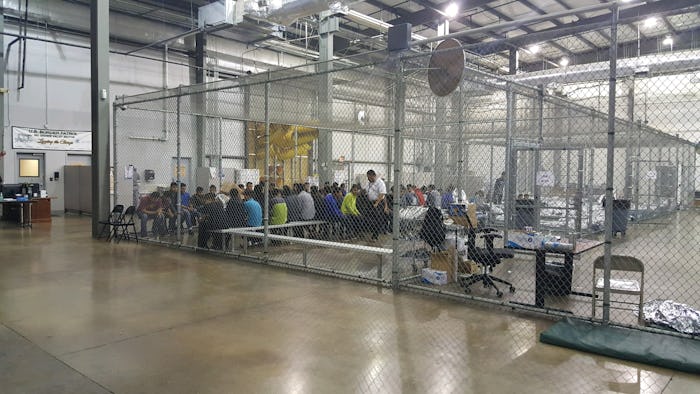Life

If You Want To Donate Items To Immigration Detention Centers, Here's How To Start
If you're a person on this planet, then you've seen the recent heartbreaking photos of immigrant families being separated at the border. There's a toddler girl, crying at her mother's feet as she is patted down by a U.S. border agent. Another young girl, Nicole Hernandez, clinging to her mother's leg as they wait to request political asylum. The reason? In May, the Trump administration announced its "zero tolerance" policy, one that federal officials say has led approximately 2,000 undocumented immigrant children into government custody. If you're like me, then you're wondering, "Can you donate to immigration detention centers?" The truth is, there are some important things you can do to help these families.
“The practice of separating families amounts to arbitrary and unlawful interference in family life, and is a serious violation of the rights of the child,” Ravina Shamdasani, a spokesperson for the U.N. human-rights office, told The Guardian. It's difficult because when big things like this feel overwhelming, it's easy to think, "But what can I do?" You are, after all, one person. But major organizations across the country have put steps in place to help you do the work, and that makes donating, volunteering, and just showing up that much easier.
For starters, there are a few organizations to which you'll want to consider donating your time, money, and/or supplies:
- The ACLU, which is currently litigating this policy in California, according to Slate.com.
- The Texas Civil Rights Project is is seeking “volunteers who speak Spanish, Mam, Q’eqchi’ or K’iche’ and have paralegal or legal assistant experience.”
- Together Rising, a Virginia-based organization that is collecting donations to help provide legal assistance for 60 migrant children who were separated from their parents and are currently detained in Arizona.
- The National Immigrant Justice Center "represents and advocates for detained adults and children facing removal, supports efforts at the border, and represents parents in the interior who have been separated from their families as a result of aggressive enforcement," according to Slate.com.
- The Refugee and Immigrant Center for Education and Legal Services (RAICES) is the largest immigration nonprofit in Texas that provides free and low-cost legal services to underserved immigrants, according to The Cut.
- The Young Center for Immigrant Children’s Rights, which uses its donations to advocate for many of the separated and unaccompanied children, according to The Cut.
- The Las Americas Immigrant Advocacy Center, which provides legal representation to low-income immigrants and families seeking reunification.
- The Detained Migrant Solidarity Committee, which organizes to oppose migrant detention and border militarization.
- ActBlue accepts single donations and gives money to eight organizations — including Asylum Seeker Advocacy Project and Human Rights First — that are working to protect migrant children separated from their families at the border.
- Al Otro Lado, which is a binational organization that serves indigent deportees, migrants, and refugees in Tijuana and Los Angeles, including deportee parents whose children remain in the U.S.
- The Kino Border Initiative, which Slate.com noted provides humanitarian aid to refugees and migrants on both sides of the border. Check out their wish-list of needed supplies.
- The Rocky Mountain Immigrant Advocacy Network supports undocumented immigrants detained in Aurora, Colorado.
- The Women's Refugee Commission advocates for the rights and protection of women, children, and youth fleeing violence and persecution.
Many organizations in border states are also seeking volunteers who can help with "organizing legal intake and interviewing families, especially if those volunteers are Spanish-speaking and have legal experience," according to The Cut.
Also on your agenda? Calling your elected officials to express your disapproval with the current policies. If you're not sure who represents you, then you can easily find out by typing in your address at GovTrack.us. And if you don't know what to say when you do pick up the phone, then the ACLU has put together a script so you can hit all of the key points.
Yes, you are one person, but together — and with the help of these organizations — many people can incite radical and necessary change.